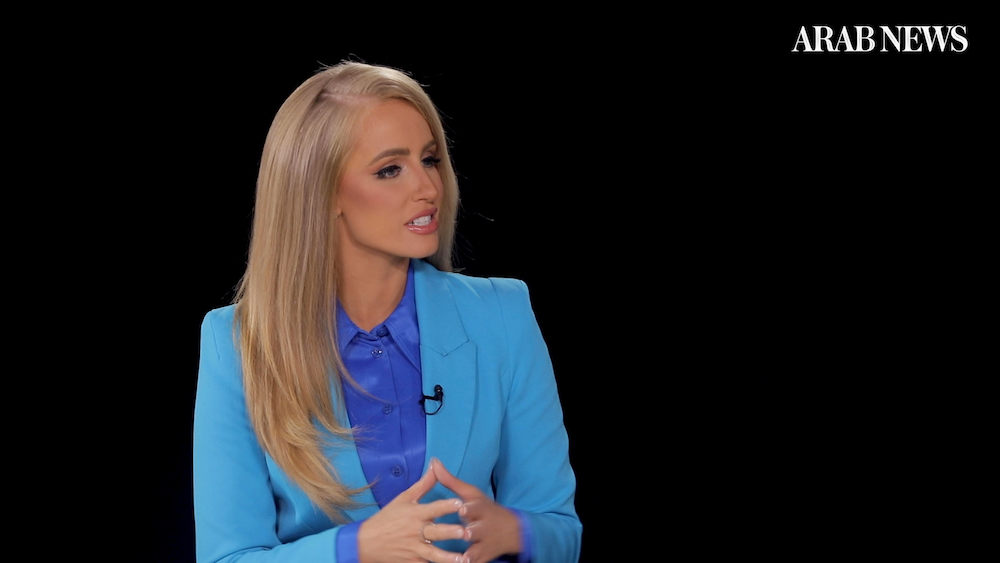DUBAI: Saudi Arabia’s growth in the aviation sector will be an essential catalyst for growth of the entire GCC’s tourism market. That was the message of Paul Griffiths, the CEO of Dubai Airports, during an interview with Katie Jensen, the host of Frankly Speaking, the Arab News talk show that features interviews with leading policymakers and business leaders.
His words come in the wake of Saudi mega-city NEOM announcing earlier this month that it will launch the world’s first commercial flights from Neom Bay Airport at the end of June, with Dubai as its first destination and London to “follow shortly.”
Griffiths, who has been a key figure in the transformation of Dubai airport into the world’s busiest by international passenger numbers, said: “I think a lot of people will be expecting me to say, ‘Well, Saudi Arabia is going to be a competitor. Actually, the Saudi market is incredibly important for Dubai.
“It is our third largest market and it’s very, very important that we establish more and more air routes. It has massively expanded over the last few years. For Saudi Arabia to develop its tourism industry is good for Dubai.”
Similar sentiments were expressed at the World Economic Forum’s annual meeting in Davos last week.
Taking part in a panel discussion on “Saudi outlook,” Khalid Al-Falih, the Saudi investment minister, said: “A rising tide lifts all boats. Regional integration is more important to the smaller but very important economies next to us than it is to Saudi Arabia. So, I believe the Kingdom’s rise in its economic and competitive performance actually helps their competitiveness. It allows companies and enterprises and the governments of those countries to integrate with the larger global economy in Saudi Arabia.”

Another speaker in the same session, Haifa bint Mohammed Al-Saud, Saudi Ministry of Tourism’s assistant minister for strategy and executive affairs, said: “The region in its entirety is a hub, so once you arrive in the region, it becomes more appealing to visit different destinations. So, (competition is) absolutely to our benefit.”
It is a message that Griffiths echoes. “If you look at more established travel regions such as Europe and the US, people rarely go just to one city and then go home again,” he said.
“Having more travel options and more cities to visit in the Middle East, which includes cities in Saudi Arabia, will be very beneficial to all the GCC countries because people will be able to come to Dubai and go to Saudi Arabia, go to Oman, go to other cities in the region and do what lots of people do around Europe.
“You rarely go to London; you want to go to Paris, you want to go to Madrid, you want to go to Rome. So, I think it’s going to be very good for the region to have an increasing number of tourism options.”
As the first CEO of Dubai Airports, Griffiths has held the post for more than 15 years, launching Terminal 3 and successfully opening Dubai’s second airport, Dubai World Central (DWC).
Dubai International airport recently released its figures, showing that more than 13.6 million passengers traveled through it in the first quarter of 2022, during its busiest quarter since early 2020. He also expects the airport to return to pre-pandemic levels by the end of 2024, a year earlier than forecast.
So, with such solid growth, is it now the time for an IPO?
Griffiths was reserved in his answer, saying that Dubai Airports “would be an attractive candidate for IPO,” and adding that its figures and “track record, even throughout the pandemic, would support such a move.”
He said that he was optimistic that “at some stage in the near future there may be such a decision,” but added that the decision would ultimately lie with the government of Dubai.
This year, the Dubai government plans to list 10 government entities on the Dubai Financial Market. Local water and electricity firm DEWA issued the world’s second-largest IPO earlier this year, the first listing of its kind for the region and the largest locally since Saudi oil giant Aramco’s record-breaking initial public offering in 2019.
There are rumors that Dubai’s toll operator Salik and district cooling firm Empower could be next. Emirates has also discussed listing on the DFM, with the Dubai-based carrier’s chairman, Sheikh Ahmed bin Saeed Al-Maktoum, telling CNBC: “I am sure that maybe sometime in the future Emirates will be in the market.”
During an aviation summit in Manchester in April, Sir Tim Clark, president of Emirates, said that he had to disconnect his phones because every banker in the world “was on our door, saying ‘We’ve got investors who want to chuck money at you.’”

According to Griffiths, it is a “sign of maturity of many cities around the region that we’re now getting to a stage where we’ve got a great track record of strong growth, good performance, good financial controls and a sound strategy. Those are all good components for an IPO.”
While being bullish about the outlook for the aviation sector and for Dubai in particular, Griffiths acknowledges that some global geopolitical and economic concerns remain. With Emirates making up 60 to 70 percent of all passenger traffic at Dubai airports, he said that the “weakness in some of the transfer markets, particularly in Asia, notably China obviously, is of concern but we’re roughly 50 percent recovered in the transfer markets, and I foresee that, that’s going to improve over the next few months.”
He said that high fuel prices were “obviously a concern” but that Emirates’ position is “pretty strong at the moment.”
“They are taking advantage of some of the strong recovery in a lot of markets, particularly in the West. And I don’t think we’ve got anything to concern us about recovery over the next few months. A few economic signs perhaps, inflation globally and, by the end of the year, maybe things will be different. But, for the moment, recovery and travel are extremely strong, and I can’t see any signs of it weakening in the near future.”
Dubai International is the busiest international airport globally, with 58.3 million people forecast to pass through its terminals this year. Still, it is currently operating with a single runway owing to refurbishment works on its northern runway.
As a result, about 1,000 flights a week are affected, with most of them re-routed to DWC. Griffiths said that although the runway is “unlikely” to open earlier than planned, it will “definitely” do so on June 22 “as scheduled.”
He explained that most of the DXB refurbishment was technical, rather “than anything that passengers will notice,” but said the “touchdown of aircraft might be a little bit smoother on the newly refurbished tarmac.”
Griffiths said that it had not been a conscious decision to reroute the low-cost carriers to DWC to keep the high-paying customers at Emirates happy, adding that “not so many” of Emirates’ passenger flights had been sent to DWC.
“They’ve actually remained mostly at DXB,” he said, referring to Dubai International airport. “Emirates has coped with the reduction by reducing the number of services.”
While the renovation is “going very well so far,” according to Griffiths, he highlighted another continuing issue that the airport is facing, calling cybersecurity a “massive problem at the moment and the number of potentially malicious attacks is increasing almost by the day.”
“If you look at the number of emails, for example, that are malicious — and the traffic that has nothing to do with business — it’s up at 70 percent. So, it’s a huge amount of the total traffic that is not emails that are solicited or anything to do with running the airport.”

When asked whether the threat of cybersecurity and cyberattacks was more significant than physical attacks, such as the Houthi drone strike on Abu Dhabi airport earlier this year, he said that the airport cannot afford to “be complacent,” adding that this was why DXB is “constantly investing in training and technology to counter the changing threat.”
According to Griffiths, Dubai Airports is also investing heavily in sustainable initiatives, using solar panels to generate power and to keep vehicles cool inside car parks, banning single-use plastics and using electric or hybrid vehicles for its ground fleet.
He said that this was important because “consumers will not be wanting to patronize any airport or airline that’s not taking sustainability extremely seriously.”
The aviation hub is also working alongside Emirates to trial the use of sustainable aviation fuel in the third quarter of this year. IATA estimates that SAF can reduce the carbon emissions of flights by about 80 percent, but many airlines have been hesitant to launch trial flights owing to its prohibitively high cost.
Griffiths says that the potential for developing sustainable aviation fuel has been hindered by supply distribution challenges. He says that unless airports worldwide can supply SAF to planes when they land, carriers would have to transport the fuel with them from the origin, so “you’re eradicating a lot of the advantages.”
He said that the solution is to get SAF injected into the plane as close to the manufacturing source as possible, and also to ensure “there is some form of subsidy in place, so we are able to absorb the cost of producing sustainable aviation fuel across the entire jet fuel supply chain, so that no individual carrier will feel the pain of having to be more environmentally friendly than others.
“We all share the cost and we all reap the rewards,” he said.
He hinted that consumers might be forced to pay more for sustainable choices, saying these higher fuel costs “may have to be passed on in small increases in ticket prices, but sustainability’s got to happen and we’ve got to pay for it somehow.”
Looking to the future, Griffiths said that he feels very “positive” about the outlook for the year ahead and that “notwithstanding the potential turbulence of the economy and political events and recovery from COVID-19,” he is “very bullish about the aerospace sector in Dubai.”
He called the city’s tourism and hospitality infrastructure “some of the best in the world,” noting that they had seen “demand for Dubai absolutely skyrocket.”
“We were 111 percent ahead of our pre-pandemic visitor arrival traffic over the end of last year, and, at the moment, we are about 100 percent,” he said, adding: “Those are pretty strong figures.”














